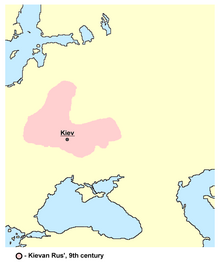Askold and Dir
Askold and Dir (Haskuldr or Hǫskuldr and Dyr or Djur in Old Norse; died in 882) were princes of Kiev and founders of the first Vikings' state in the Dnieper .[1] According to the Nikon Chronicle their names were spelled out as Oskold and Dyr.[2] According to the Primary Chronicle, they were of Rurik's Varangian clan.

Primary Chronicle[]
The Primary Chronicle relates that Askold and Dir were sanctioned by Rurik to go to Constantinople (Norse Miklagård, Slavic Tsargrad). When travelling on the Dnieper, they settled in Kiev seizing power over the Polans who were paying tribute to the Khazars. The chronicle also states that they were killed by Oleg the Seer in 882,[3] yet they were buried in various places. According to the Primary Chronicle he tricked and killed Askold and Dir using an elaborate scheme. Vasily Tatischev, Boris Rybakov and some other Russian and Ukrainian historians interpreted the 882 coup d'état in Kiev as the reaction of the pagan Varangians to Askold's baptism. Tatischev went so far as to style Askold "the first Russian martyr".[citation needed]
Tale of Ragnar's Sons[]
According to Olof von Dalin, Askold (as Asleik Bjornson (Diar)) was the son of Björn Ironside,[4] and the grandson of Ragnar Lodbrok, a semi-legendary king of Sweden (ca. 815-830). Other researchers believe that Askold was the son of Hvitserk[5] or Hvitserk himself,[6] another son of Ragnar. Hvitserk was a contemporary of Rurik, and was said to have waged a war of conquest in Eastern Europe.
Al-Masudi[]
The only foreign source to mention one of the co-rulers is the Arab historian Al-Masudi. According to him, "king al-Dir [Dayr] was the first among the kings of the Saqaliba (Slavs)." Although some scholars have tried to prove that "al-Dir" refers to a Slavic ruler and Dir's contemporary, this speculation is questionable and it is at least equally probable that "al-Dir" and Dir were the same person.[7] It seems that in Old East Slavic it was originally "askold Dir" and not "Askold i Dir" as it is known from the Primary Chronicle. The word askold or oskold is derived from Old Norse óskyldr meaning strange, so there was probably a ruler of Kiev called Dir by the Slavs and the Varangians called him something like "óskyldr Dyri"—stranger Dir. The Rus' Varangians later forgot the meaning of óskyldr so Nestor wrote about two rulers of Kiev—about Askold and Dir.[8]
Facts and records[]
The Rus' attack on Constantinople in June 860 took the Greeks by surprise, "like a thunderbolt from heaven," as it was put by Patriarch Photios in his famous oration written for the occasion. Although the Slavonic chronicles tend to associate this expedition with the names of Askold and Dir (and to date it to 866), the connection remains tenuous. Despite Photius' own assertion that he sent a bishop to the land of Rus' which became Christianized and friendly to Byzantium, most historians discard the idea of Askold's subsequent conversion as apocryphal.
A Kievan legend identifies Askold's burial mound with Uhorska Hill, where Olga of Kiev later built two churches, devoted to Saint Nicholas and to Saint Irene. Today this place on the steep bank of the Dnieper is marked by a monument called Askold's Grave.
Legacy[]
- Russian screw frigate Askold (1854) (see List of Russian steam frigates)
- Russian cruiser Askold (1900)
See also[]
References[]
- ^ Kotlyar, M. Askold. Small Dictionary of History of Ukraine. "Lybid". Kiev 1997
- ^ Kotlyar, M. Kyi and Askold. Warhitory.ukrlife.org. 2002
- ^ Many scholars believe the conquest of Kiev took place a generation later; see Oleg of Novgorod for discussion of the controversy surrounding this date.
- ^ Von der Chronistik zur modernen Geschichtswissenschaft: Die Warägerfrage in der russischen, deutschen und schwedischen Historiographie (Veroffentlichungen Des Osteuropa-instituts Munchen, Band 5) Taschenbuch – 1. Januar 2000. p. 398.
- ^ Adolf Stender-Petersen, Heinrich Bach. Varangica. 1953, p. 207
- ^ Войтович Л.В. Чи був Рагнар Лодброк на руських землях? // Україна в Центрально-Східній Європі. — Вип. 16. — К., 2016. C. 93-107.
- ^ Golden, P.B. (2006) "Rus." Encyclopaedia of Islam (Brill Online). Eds.: P. Bearman, Th. Bianquis, C.E. Bosworth, E. van Donzel and W.P. Heinrichs. Brill.
- ^ The interpretation of name Oskold/Askold is mentioned in the K.J.Erben's translation of the Primary Chronicle into Czech language.
External links[]
| Wikimedia Commons has media related to Askold & Dir. |
- Guide to Askold's Grave
- Yasterbov, O. The reign of the princes Askold and Dyr: beginnings of the mighty Kyivan state. . 29 November 2005. (in English)
- Kyiv
- Vikings
- Princes
- History of Kyiv